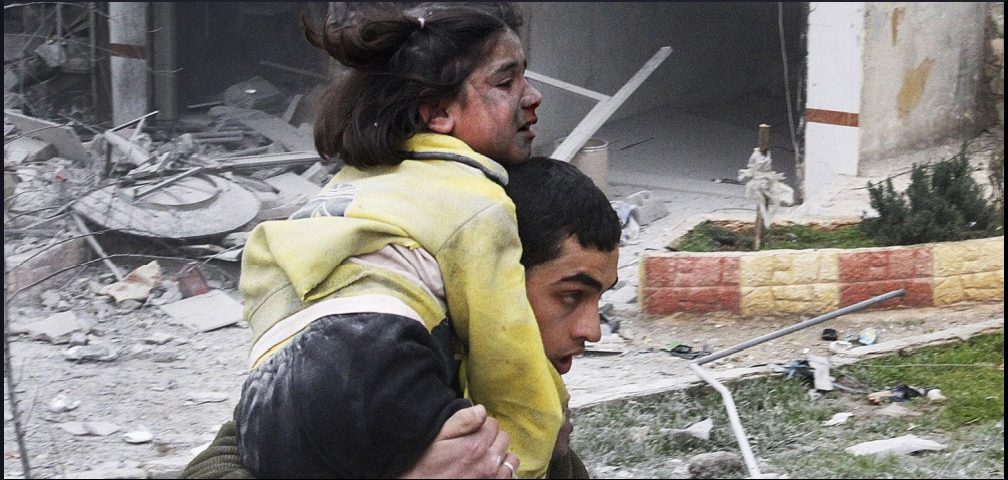by Alan MacLeod, published on Fairness and Accuracy in Reporting, March 3, 2021
Aversion to military intervention has been the default position of the left for at least half a century—certainly since the huge protests against the Vietnam War. Washington planners lamented the development of the so-called “Vietnam Syndrome”—a widespread progressive hostility towards US interventions (invasions, bombings, coups or economic warfare) around the world. A 2018 survey found the public still infected, with over two-thirds in support of limiting military action overseas, including 78% of Democratic voters.
President Joe Biden’s record of support for foreign intervention spurns that progressive tradition. As chair of the Senate Foreign Relations Committee, Biden played a key role in selling the Iraq invasion to both Democratic colleagues and a skeptical public. He was also vice president in an administration that was bombing seven countries simultaneously by its end in 2016, and was a strong voice within the administration in favor of intervention (Foreign Policy, 2/25/11).
Worse, many of Biden’s cabinet picks have alarmed antiwar and human rights activists. His director of national intelligence, Avril Haines, was instrumental in covering up the US torture program, while his choice for head of USAID, Samantha Power, supported both the Iraq and Libya wars, arguing that the US must intervene on humanitarian grounds.
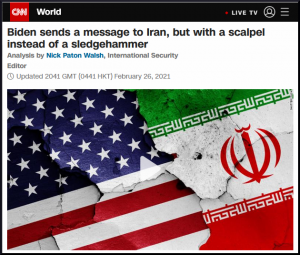
Earlier this week and barely a month into his presidency, Biden launched an airstrike on Syria, killing a reported 22 people, in supposed response to a rocket attack on a US base near Erbil, Iraq, that killed one US contractor. CNN international security editor Nick Paton Walsh (2/26/21) applauded the move, claiming Biden had successfully “sent a message” to Iran while being as “minimally lethal” as possible. For CNN, Biden had “used a scalpel instead of a sledgehammer.” Bloomberg columnist Bobby Ghosh (2/26/21) was similarly delighted, lauding the president’s unwillingness to tolerate Iranian “aggression,” claiming that this was sure to snap Iran out of its “sense of impunity.”
If history is any judge, further aggressive actions will also be met with approval by corporate media, who have continually found creative ways to pitch such actions to the traditionally anti-interventionist left, primarily through the use of progressive language to justify Washington’s global agenda.
Media are experts in using progressives’ empathy and compassion against them, presenting them carefully selected images and stories of suffering around the world, and suggesting that US military power can be used to alleviate it. As such, intervention is sold to the US left less on the basis of fear than of pity.
But when, as in the examples below, US actions make the situation worse for the peoples affected, the corporate press is careful to ignore or gloss over that suffering, or at least not present it as a direct consequence of US meddling in other nations’ affairs.
Not an invasion, a ‘no-fly zone’
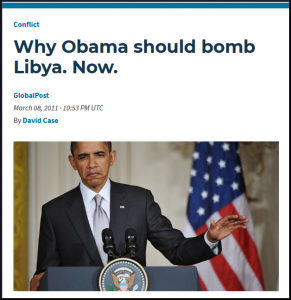
In the run up to the 2011 NATO intervention in Libya, media tried hard to sell the concept of a supposedly “humanitarian intervention.” “Why Obama should bomb Libya. Now,” ran Public Radio International’s headline (3/8/11). The US must act immediately to “bring to justice this brutal kleptocrat” (Moammar Gadhafi) who was attacking his own people, it argued. Without NATO action, it insisted, “a humanitarian disaster could soon unfold,” and failing to intervene would constitute a “victory for dictators across the globe.”
The New York Times (3/18/11) reported that three women close to Obama—Hillary Clinton, Susan Rice and Samantha Power—were teaming up to “stop a looming humanitarian catastrophe in Libya.” Pro-intervention human rights lawyers like Geoffrey Robertson waxed lyrical about how the West’s fighter jets and cruise missiles would bring peace and prosperity to Libya (London Independent, 3/5/11, 10/23/11). “The civilised world has the right, and duty, to intervene. Failure may mean the mass murder of innocents,” he insisted (Sydney Morning Herald, 3/7/11).
In an article titled “Libya: The Case for US Intervention,” Time (3/7/11) insisted that any action would be focused not on overthrowing Gadhafi, but merely on establishing a “no-fly zone” to stop Gadhafi killing more civilians. Meanwhile, the Atlantic (3/10/11) published a list of “16 Ways the US Can Help Libya,” which included a number of military options. Doing nothing, it conceded in the final sentence after 1,700 words of regime change propaganda, was “also an option.” But, it told readers, that might be “the riskiest option of all.”
Of course, the “no-fly zone”—sold as an attempt to stop Libyan jets bombing their own country—quickly turned into a full-on military attack, with NATO air power driving Gadhafi into the hands of militia forces that brutally killed him. “We came, we saw, he died,” Secretary of State Hillary Clinton laughed to a CBS reporter (10/20/11) when she heard the news.
NATO’s intervention left much of the country destroyed and in the hands of ISIS, replete with slave markets. Yet when reporting on this fact, the corporate press were careful to erase NATO’s role in all of this (FAIR.org, 11/28/17), thereby helping make sure the Vietnam Syndrome did not metastasize into the Libya Syndrome. Seven years after NATO destroyed Libya’s government and left the country in the hands of feuding warlords, the New York Times (5/3/18) offered a multimedia tour of a ruined Benghazi, ostensibly answering the question, “How did the city come to this?”—and never once mentioned the NATO assault.
Behind closed doors, however, the “humanitarian intervention” crowd championed in media was far more frank about its motives, sounding as crass and bloodthirsty as Donald Trump. Leaked emails show that Neera Tanden, the president of the liberal Center for American Progress, was demanding that the US bomb Libya and make them pay us back for the pleasure: “We have a giant deficit. They have a lot of oil…. Having oil-rich countries partially pay us back doesn’t seem crazy to me,” she wrote (Intercept, 11/5/15). Tanden was Biden’s choice to direct the Office of Management and Budget (FAIR.org, 2/24/21), a nomination now withdrawn due to her history of intemperate tweeting.
If only US intervened more
The Guardian’s editorial board (9/3/15) denounced Western inaction in Syria, while demanding “much more must be done” to help refugees in the Middle East. “Compassion is necessary, and there are hard decisions to be made about Europe’s place in the world,” it argued, before clearly implying what sort of solution it wanted to see. “The refusal to intervene against Bashar al-Assad gave the Syrian president permission to continue murdering his people,” it wrote, suggesting that only “limited air strikes” would be inadequate.
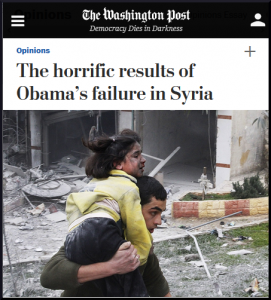
On the same day, the Washington Post (9/3/15) went further. In a column headlined “The Horrific Results of Obama’s Failure in Syria,” columnist Michael Gerson bemoaned that “relatively small actions might have reduced the pace of civilian casualties in Syria.” “How hard would it have been,” he asked, to order one more military intervention or some airstrikes? This would have swung the balance to what he called “more responsible forces.” Whether these “responsible forces” were the same as the “moderate rebels” his newspaper later admitted were “intermingled” with Al Qaeda/Al Nusra (Washington Post, 2/19/16) was not made clear. Instead, Gerson concluded, all we got was four years of a “pantomime of outrage”; a “sickening substitute for useful action.”
In reality, Obama was intervening heavily in Syria. The Post (6/12/15) itself had noted that the CIA was spending $1 billion per year (1/5th of its entire budget) on training, arming and fielding 10,000 of those “moderate rebels.” The Pentagon had also spent around half a billion dollars on a similar endeavor. There were also an estimated 1,000 US troops occupying Syria (FAIR.org, 9/5/15, 4/7/17).
Yet the “Obama did nothing” line continued into the Trump era, with the Associated Press (4/5/17) reporting:
After warning Assad that a chemical attack would cross a red line and trigger US action, Obama failed to follow through. Rather than authorizing military action against Assad in response to a sarin gas attack that killed hundreds outside Damascus, Obama opted instead for a Russia-backed agreement to remove Syria’s chemical weapons stockpiles.
That was seen internationally as a major blow to US credibility and, for Obama’s critics, a prime example of weak leadership.
Thus a decision to favor diplomacy over potentially triggering World War Three was presented as an inherent “failure” of a “weak” Obama administration.
And when Trump took a more warlike stance on Syria, authorizing airstrikes on the country in 2017, corporate media went from resistance to assistance. A FAIR study (4/11/17) found that 39 of the top 100 US newspapers by circulation published editorials praising the decision, with only one (Houston Chronicle, 4/7/17) offering limited pushback on technical grounds. Meanwhile, Brian Williams, anchor on the supposedly adversarial network MSNBC (4/6/17), seemed to reach a higher plain of ecstasy watching Trump commit a major international war crime:
We see these beautiful pictures at night from the decks of these two US Navy vessels in the eastern Mediterranean. I am tempted to quote the great Leonard Cohen: “I am guided by the beauty of our weapons.” And they are beautiful pictures of fearsome armaments.
L’impérialisme humanitaire
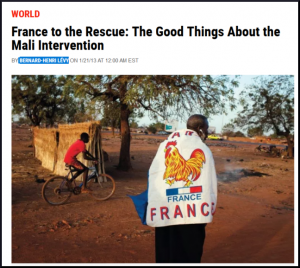
Media will also promote military intervention by foreign states, if the US government approves of it. A case in point was the French invasion of Mali in 2013. “France Comes to the Rescue of Mali,” thundered a Washington Post editorial (1/11/13). “For months, it has been evident to many global observers that a military intervention would be necessary,” it began, insisting that the country “must be rescued from becoming a failed state and a haven for the Islamic radicals.” It failed to mention that Mali was being overrun by jihadist forces precisely because of the already discussed French and US actions in nearby Libya.
An NPR segment (2/4/13) also implied that France’s actions were unimpeachable. When one guest suggested that a “cynical” position would be that French President François Hollande did it primarily to protect his ally Niger and to boost his ratings, this was denounced. The idea that this could be something more cynical, like a colonialist takeover, was summarily rejected, since France was invited to take action by the Malian government. Indeed, one guest on the program had just written an article called “The End of Neocolonialism.”
Newsweek (1/18/13) also applauded the move, running a piece by claiming it “restates the prominent role of France in the front lines of the struggle for democracy.” Complicating the picture was the bothersome fact that France was actually supporting a military dictatorship that had overthrown a democratically elected government less than a year previously. This conundrum was solved by not mentioning it.
Stop hitting yourself
Venezuela has been the target of more than two decades of US regime change operations, all met with virtually unanimous approval from corporate media (FAIR.org, 11/1/05, 5/16/18, 4/30/19). Chief among the cheerleaders has been the Washington Post. Its board puts out a constant flow of pro-regime change editorials (e.g., 4/14/02, 6/2/16, 6/30/17, 12/7/20), ignoring the effect US sanctions have had in devastating the country.
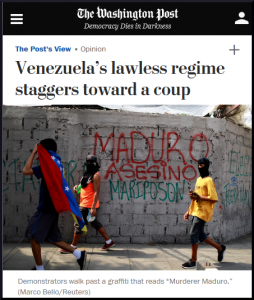
A typical example of this was a 2017 editorial (Washington Post, 7/27/17) that claimed that the “once-prosperous oil-producing nation has descended into political chaos and humanitarian crisis over the past several years.” The culprit, for the Post, was clear: it was the “Maduro regime”—that is, the government of President Nicolás Maduro—that “bears exclusive blame” for the “catastrophic economic conditions it has created.” The US role, it told readers, had been “consistently inadequate—too little and too late,” although it praised Trump for further sanctioning the country, insisting that he was only targeting “senior Venezuelan officials involved in drug trafficking and the suppression of democracy.”
In reality, Trump’s sanctions were aimed at the “poor and most vulnerable classes,” according to the United Nations. A study (4/25/19) by the Washington-based Center for Economic Policy Research (CEPR) later estimated that the new sanctions the Post had cheered about were responsible for the deaths of more than 40,000 Venezuelans between August 2017 and the end of 2018 alone.
The report could have been used by liberal outlets to hammer Trump. But the organizations that reported on CEPR’s findings were few and far between, and mostly limited to small, foreign sources (FAIR.org, 6/26/19).
The humanitarian impact of US sanctions has also been hidden by media when it comes to Lebanon (FAIR.org, 8/26/20) and Iran (FAIR.org, 4/8/20), allowing the corporate press to represent those countries’ struggles as purely a result of their governments, thus further fueling calls for something to be done—that “something” far more likely to be increased intervention than an end to economic warfare. In essence, the sanctions put in place the economic conditions necessary for corporate media to demand intervention on humanitarian grounds.
Amazingly, bombs, missiles, coup attempts and sanctions don’t help foreign countries flourish. On the contrary, they are often the catalysts for political, social or humanitarian situations to worsen. These conditions, in turn, are subsequently used as more justification for increased sanctions or bombings. It is a beautiful system: when the cure causes the disease, you will never run short of demand for your medicine.
The forgotten war
Perhaps the most blatant example of ignoring the effect of US actions is Yemen, the country the United Nations has called, for some years now, the “world’s worst humanitarian crisis.” Some 24 million people (80% of the population) require assistance, as cholera and other diseases run rampant. If humanitarian intervention is necessary anywhere, it is here.
Unfortunately, the US is already intervening—to make matters much worse. For years, the US has been arming, training and supporting the Saudi-led coalition’s onslaught, largely aimed at the civilian population, signing a reported $350 billion arms deal with Riyadh, and even helping with target acquisition for Saudi bombers. The Saudis have deliberately targeted civilian infrastructure; since the war began in 2015, they have carried out an attack on medical or water facilities once every ten days, on average. The US has defended its ally at the UN, and even pressured member states into reducing their donations to the relief effort. As a result, aid to Yemen halved to just 25 cents per person per day in 2020.
Yet outlets with comparatively progressive audiences have not been informing their audiences of these facts, let alone calling for a humanitarian intervention. In fact, MSNBC went over one year without mentioning US involvement in the world’s bloodiest ongoing war. For comparison, over the same period, it ran 455 segments on Trump’s connections to porn star Stormy Daniels (FAIR.org, 7/23/18). Yemeni journalists complain that the West sees Iraq and Syria as more “newsworthy” than the conflict raging further south, making it harder to find publishers for their work. A search for “Syria” on the websites of the New York Times, CNN or Fox News will elicit 3-4 times more results than one for “Yemen” over the same time period.
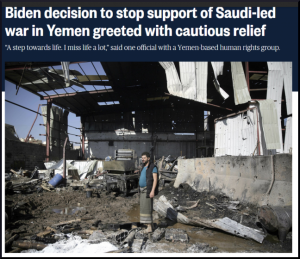
Biden has announced a withdrawal of support for the Saudi offensive, a sign of what he modesty labelled America’s “moral leadership” of the world. “We shine the light, the lamp, of liberty on oppressed people,” the president said in a speech publicizing his new position, a stance that generated considerable praise (e.g., NBC News, 2/5/21; New York Times, 2/5/21; The Hill, 2/6/21).
Yet as Yemen-born academic Shireen Al-Adeimi (In These Times, 2/4/21) pointed out, Biden only committed to stopping support for “offensive operations,” while doubling down on Saudi Arabia’s right to “defend” itself from supposed Houthi aggression. This appears to be only a repositioning of Obama’s Yemen stance. Furthermore, helping Saudi Arabia “defend” itself could de facto support the offensive, as it will free up more Saudi units for offensive duties.
The point of the language of humanitarian intervention is to try to manufacture consent for regime change, war or sanctions on foreign countries among progressive audiences who would normally be skeptical of such practices. This is done through selective outrage, naked deception and the use of a new language of humanitarian intervention, pulling on the heartstrings of readers to get them to support fundamentally illiberal actions. Once it is no longer politically expedient, interest in the rights of others is dropped and the press turns its attention to the next story, leaving the survivors to pick up the pieces of their lives.
Alan MacLeod is a Staff Writer for MintPress News. After completing his PhD in 2017 he published two books: Bad News From Venezuela: Twenty Years of Fake News and Misreporting and Propaganda in the Information Age: Still Manufacturing Consent. He has also contributed to Fairness and Accuracy in Reporting, The Guardian, Salon, The Grayzone, Jacobin Magazine, Common Dreams the American Herald Tribune and The Canary.
